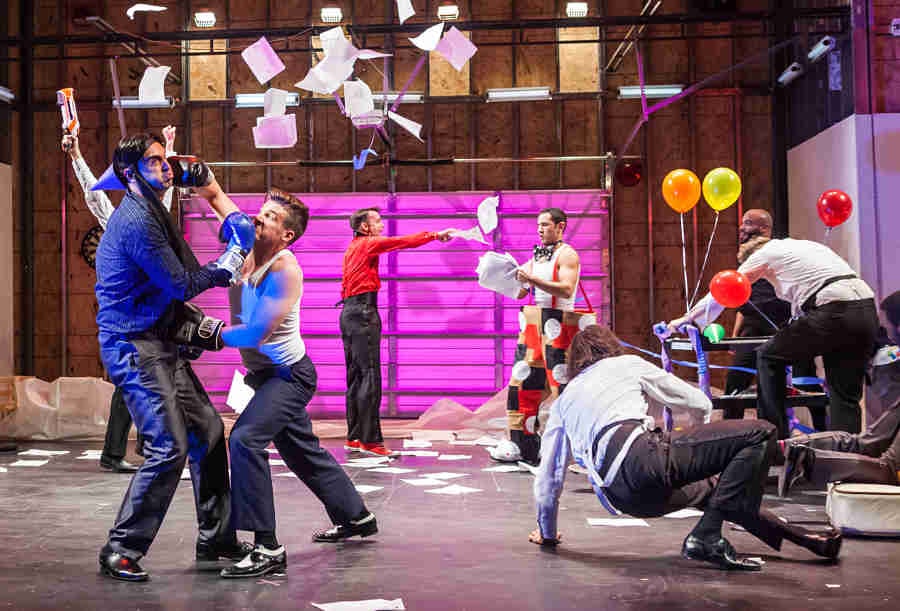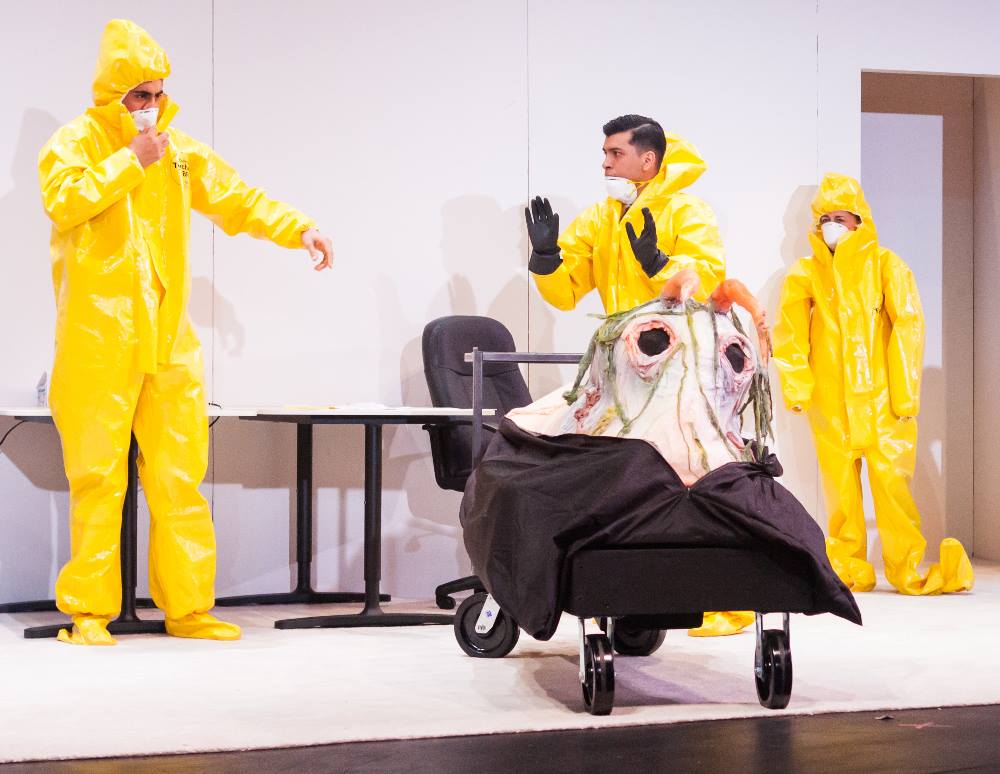In a sign of changing times (and technology), 2015 may mark the first year that the gay cruising app Grindr was featured as a plot device in a Humana play. That update comes courtesy of Pig Iron Theatre Company’s I Promised Myself to Live Faster. Pig Iron’s inclusion is in the Humana tradition of presenting works not only by individual playwrights but by ensembles (SITI Company, Rude Mechs).
Faster combines the antics of the Charles Ludlam’s Ridiculous Theatre Company with the space-epic grandeur of Star Wars, spinning those influences into a blender to produce, what’s referred to in the script as, a “queen space opera.” The play follows a gay man, pulled through a glory hole into outer space, where he embarks on a quest to find the Holy Gay Flame and thereby save all of the homosexuals in the universe.
The show earned rapturous laughter from the audience, which contained a mix of millennials and baby boomers, who were more than game to sit there “laughing at people licking butts,” as the play’s director (and Pig Iron cofounder) Dan Rothenberg delightfully puts it.
“It’s sort of wild to see this other play Dot, which is such a different play in terms of style,” says Rothenberg. “But listening to the gay characters in that play talk about some of the very same things that we are digging into, but in totally different ways stylistically—it’s great to be able to go see [both plays] and say, ‘Oh, there’s actually similar concerns, similar things are getting spun around in people’s minds about sex and queer identity.’”

Masculinity and gay identity were also prominent themes in The Glory of the World by Charles Mee, directed by Waters. This was the kind of play for which pre-show buzz did little to prepare you: Quotes ranged from “It’s something else” and “I can’t describe it” to the succinct “It’s pretty homoerotic.”
Glory began atypically: Waters himself walked onstage, barefoot, and took a seat at a desk with his back to the audience. A 15-minute silence followed, filled only by projections of play text telling the audience to, “Listen, it’s raining.”
Then, at last, a small army of 17 men came onto the stage, singing a birthday song for Thomas Merton, the late Trappist monk and poet. To celebrate what would have been Merton’s 100th birthday, the plays has the men variously toast him as a Buddhist, a Catholic, a Communist—honors that soon devolve into a verbal fight over who exactly Merton was. The verbal fight then turns into a real fight, complete with boxing gloves, swords, plungers and a chainsaw.
At one point in Waters’s staging, an actor pulled out a microphone and began a slow-rock version of Britney Spears’s “Oops, I Did It Again!” while a life-sized rhino puppet walked across the stage on a chain and men in speedos played around lawn sprinklers. That’s not even a quarter of the antics the audience witnessed.
But there was some method to the madness. As Waters explains, the lawn sprinklers and the rhino puppet were references to Thomas Merton’s essay “Rain and the Rhinoceros” essay, a meditation on civilization gone mad and on Ionesco’s classic Rhinoceros. Waters sums up the essay as being “about noise, about making an awful lot of noise; we just make a racket because we’re terrified of silence. So that was an inspiration for the piece.” Not to mention, Waters says, that Merton’s writing is “real dude writing.”
Glory marks Waters’s sixth collaboration with Mee, a relationship that began in 2000 with Big Love at Humana. It also advances a goal Waters has been championing since he took the helm of Actors Theatre three years ago: to create work that speaks specifically to a Louisville audience.
“I’m really really keen and passionate about this, actually, that Actor’s Theatre does work, and commissions work, that deals with the local community, with figures in the local community,” says Waters. “If you live in New York, you see plays about living in New York. If you live in London, you see plays about living in London. And if you live in Louisville, and most places in the world, you don’t see yourself onstage.”
Consequently, both Glory and the short play anthology That High Lonesome Sound (written by Jeff Augustin, Diana Gristanti, Cory Hinkle and Charise Castro Smith) deal specifically with Kentucky icons: Merton lived a majority of his life in an abbey 40 miles away from Louisville, while the anthology took as its theme one of the state’s indigenous musical forms, bluegrass.
But the Humana brand is still new plays, sometimes shockingly new. The Ten-Minute Plays anthology—which included Rules of Comedy by Patricia Cotter, So Unnatural a Level by Gary Winter and Joshua Consumed an Unfortunate Pear by Steve Yockey—elicited gasps. Though short, these playlets managed to squeeze in an exotic sea monster, pears that provide immortality and copious amounts of blood.
Making audiences’ eyes widen and their minds race may be the point.
“I think the work should be challenging—I like the risk of it,” says Waters matter-of-factly. “Someone asked me, ‘Well, is that a play?’ And I answered, ‘It is a play because it’s happening on a stage with people performing in it.’ I’m personally really really interested in what the form can take.”

HIGHLIGHTS FROM THE HUMANA PLAYS:
“Ok, ladies and gentlemen. I hope you’re comfortable, because the show is Four, Hours,
Long. But don’t worry—it’ll feel like a brisk 90 minutes.” —I Promised Myself to Live Faster from Pig Iron Theatre Company
“I think it’s hard to accept certain things. You know, it’s like, what’s the difference between acceptance and just giving up? I’m afraid that I will just give up.” —I Will Be Gone by Erin Courtney
“I slept in the kitchen for a week, God. I didn’t have the right words to answer the phone or go to my book-club or go get the mail so I didn’t do any of those things. But now I’m awake. And I don’t know where to start. Exactly. Except: over. Again.” —The Roommate by Jen Silverman
“To have a writer’s life, it is like having a monk’s life or it could be to have a monk’s life that means you can have the perfect writer’s life that you can’t have any other way a place to write to be alone, quiet.” —The Glory of the World by Charles Mee
“There can only be one black gay voice and no one wants to hear mine right now! OKAY???!!!” —Dot by Colman Domingo


